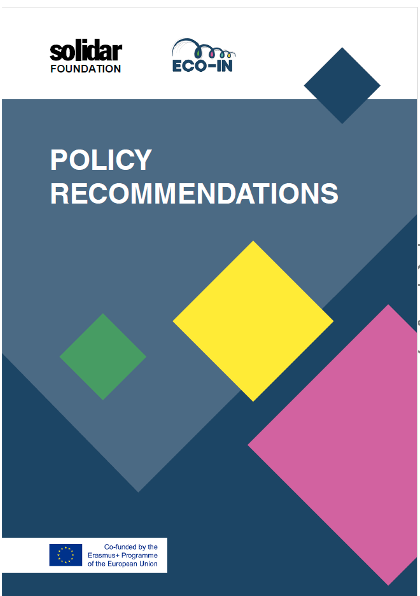Recommendations for policymakers

The Algorithm for New Ecological Approaches to Inclusion (ECO-IN) project was launched in 2019 as part of the Erasmus+ program with the aim of developing a new evaluation system and training activities, capable of generating inclusive schools starting from an “ecological” approach. To achieve this goal, the project consortium, which includes the University of Perugia, FORMA.Azione, the Lithuanian Union of Education, the University of Urbino, MIRADA LOCAL (Spain), the School Inspectorate of Alba County ( Romania) and the SOLIDAR Foundation (Belgium), conducted an in-depth research on school inclusion in primary and secondary education in Belgium, Italy, Lithuania, Romania, Spain.
Based on the needs identified in these EU Member States and following further research at the European level, the project produced: an innovative and digitized evaluation protocol to evaluate and monitor successful inclusion practices; policy recommendations to promote inclusion and provided specific training to prepare all interested stakeholders in the field of education (teachers, school leaders, policy makers, educators, external experts, parents, families) to become an active and proactive part within the reference school system following an “ecological approach”.
The following policy recommendations are based on the results of the ECO-IN project and reports produced by FORMA.Azione, the Lithuanian Education Union, MIRADA LOCAL, the Alba County School Inspectorate SOLIDAR, the University of Perugia and the University of Urbino, as well as on the contributions collected at the ECO-IN high-level conference on policy recommendations for school inclusion by representatives of the following organisations: CESE Workers Group, ETUCE, European Commission (DG EAC), LLLP, OBESSU and S&D Group of the May 22, 2023 in Brussels.
- Develop more flexible and inclusive curricula
- Allocate adequate resources to education and inclusive education
- Training and professional development of design teachers
- At the national level, adequate monitoring and evaluation systems are needed.
In order to concretely realize social inclusion in school, we invite the different policy makers and those involved in the definition of educational strategies to eliminate barriers to inclusion, to support the following recommendations:
DOWNLOAD THE RECOMMENDATIONS IN ENGLISH LANGUAGE
DOWNLOAD THE RECOMMENDATIONS IN ITALIAN LANGUAGE
DOWNLOAD THE RECOMMENDATIONS IN CATALAN LANGUAGE
DOWNLOAD THE RECOMMENDATIONS IN SPANISH LANGUAGE
